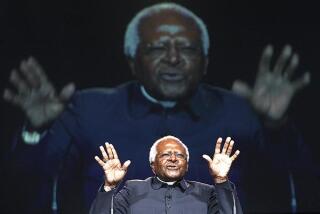The Difficult Mrs. Mandela
- Share via
President Nelson Mandela, as the guardian of South Africa’s nascent democracy, made a tough but necessary decision when he dismissed his estranged wife, Winnie Mandela, from his Cabinet. Never the team player, she has used her post as deputy minister of arts, culture and science to spout inflammatory rhetoric more suitable to an underground freedom fighter than a government official.
Winnie Mandela continues to act as if there had never been a historic transfer of power last year from white minority to black majority, an achievement for which she deserves some credit. But Mrs. Mandela’s methods encourage distrust of government and fan impatience with the political process.
This is not to say her cause is unjust. Even if her demeanor provokes outrage in government quarters, Mrs. Mandela fights on for better housing for the millions of blacks who continue to live in hovels or cramped hostels. She prods the new government for better health care and schools. She demands progress, and when she doesn’t get it she is quick to blame a weak government. That’s an effective approach for an outsider, but until her dismissal Mrs. Mandela was part of the very government that she challenged so freely.
Mrs. Mandela has every right to speak freely under South Africa’s newly democratic system, but President Mandela has a hard enough job without having to confront disloyalty and rampant disregard in his Cabinet. The final straw came after the president asked her to attend a key meeting of the African National Congress. She refused, made an official trip to West Africa instead and returned unapologetic. When forced to make public a letter of apology she indicated that government officials had dictated the message.
This is not the first time Mrs. Mandela has been in trouble. A court convicted her of kidnaping a teen-ager who was beaten to death by her thug-like coterie of security guards. Police recently raided her home seeking evidence of political corruption, but the search warrant was subsequently ruled invalid.
Despite these scandals, the defiant Mrs. Mandela remains popular and respected by many South Africans for the leadership she exercised during her husband’s 27 years of imprisonment. She has earned that respect. However, she should not be allowed to undermine the president’s authority.
Nelson Mandela must foster a democracy in turbulent times. He must fight challenges from all sides: from whites reluctant to give up power and privilege, from blacks eager to share the riches of their ancestral homeland. He must succeed, and that will be easier with a unified government.
More to Read
Sign up for Essential California
The most important California stories and recommendations in your inbox every morning.
You may occasionally receive promotional content from the Los Angeles Times.













